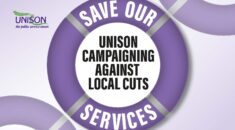Local government conference heard today of the “stark results” of £1bn of cuts from social care budgets under the coalition government – and of UNISON’s fight to defend its members and those in their care.
Introducing the service group executive annual report on social care, national officer Helga Pile told delegates of the increasing exploitation of care workers, over 200,000 of whom are being paid less than the minimum wage.
And she spoke of the frustration of members unable to provide more than a “plaster on the wounds” of people who needed so much more.
“We have to give social care staff their voice, so they can tell the public what’s happening to them and the people who need their care,”she said.
In a debate on the UNISON’s ethical care campaign, Sue Brierley from Wolverhampton said she was encouraged by the progress made since the introduction of the union’s ethical care charter, but that regions and branches needed to work harder to persuade more councils to sign up.
“We deserve the stability of contracts with fixed hours, and we deserve the dignity of a living wage,” she said.
Cathy Bayton of the service group executive quoted Dave Prentis, who has described the ethical care campaign as one of the most important campaigns UNISON has ever led.
“Thousand of care workers are enjoying better terms and conditions and thousands of elderly people are receiving better care,” she said. And she added that, in “shaping the debate” on home care, UNISON had also influenced the Labour Party to promise a similar charter of its own, from government, should it win the next general election.
But agreeing with her fellow speakers, Ms Bayton said that there was a “huge task ahead” – not only to persuade another 200 councils in England, Scotland and Wales to adopt the charter, but to organise and recruit the thousands of home care workers that are not yet in a union.
The conference welcomed the move from the Care Quality Commission (CQC) to invest more resources into the regulation of health and social care services, and the return to a specialised form of inspections that UNISON has long called for.
At the same time, delegates agreed that it was vital that the regulation of hospitals and GPs not be prioritised over that of adult social care, and that the CQC highlight the links between working conditions for the adult social care workforce and the quality of the care they can provide.





